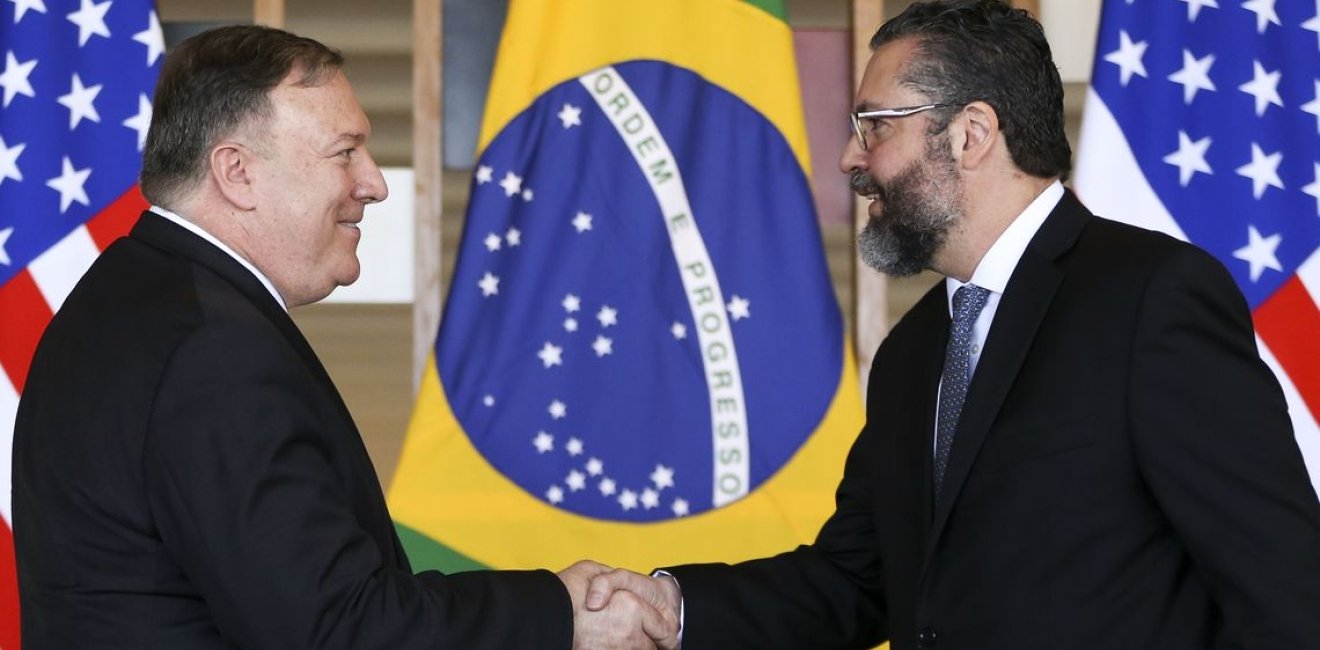
A blog of the Brazil Institute
Hopes are running high for the United States and Brazil. There is the prospect of a personal rapport between the apparent kindred spirits now occupying the presidencies of both countries, Donald Trump and Jair Bolsonaro. There is the promise of policy alignment on issues like the location of their embassies in Israel and their economic attitudes towards China. And there is also a rare and widespread optimism — however cautious — among the international business and financial communities regarding the potential opening of Brazil’s historically closed economy. Phrases previously seldom heard regarding the sometimes frosty Brazil-US relationship are now commonplace: many speak of a unique opportunity, a great moment. Ernesto Araújo, the new Brazilian foreign minister, even went so far as to declare, “The sky is the limit” for the United States and Brazil.
The current moment is unusual indeed, as a brief dip into the history of Brazil-US relations illustrates. Since the Second World War, setbacks and disagreements have characterized relations between the two most populous nations in the Americas, despite a handful of opportunities for improvement. Two competing theories aim to explain the estrangement: an older argument points to inevitable and perpetual misunderstanding between the countries as part of an “emergent rivalry”; while a more contemporary one suggests past disagreements were the fault of historical circumstance, personal differences, and bad luck, which need not define the relationship going forward.
Yet which theory best predicts the future of Brazil-US relations? Comparing what the two theories say about a previous moment of hope for the bilateral relationship — namely, Henry Kissinger’s failed 1970s bid for a strategic partnership with Brazil — can help us gauge how much concrete progress to expect from today’s high hopes and declarations of goodwill.
Brazil and the United States: Natural Rivals?
The notion that Brazilian and US interests are hopelessly divergent derives from the work of the leftist Brazilian intellectual Luiz Alberto Moniz Bandeira. In the late 1980s, Moniz Bandeira provocatively suggested that Brazil-US relations were characterized by a rivalidade emergente, or “emergent rivalry.” He based this on a realist analysis of the relationship, writing, “The material interests of the nation are the principle to which all others in international relations subordinate themselves.”
For the United States and Brazil, this principle boded ill. The material interest of Brazil as a nation lay in industrialization, modernization, and the achievement of an independent policy that would reduce its dependence on commodity exports to the United States and other countries. The material interests of the United States, after the Second World War, lay in maintaining a strong influence over the Americas, which would preclude a robustly independent policy for Brazil. For proponents of this school of thought, it was no surprise that spats plagued the relationship despite both governments’ strong anti-communist stance during the Cold War: ideology could not cover up the problems caused by opposing material interests.
We can see how Moniz Bandeira’s theory applies to moments of potential bilateral breakthrough by examining his treatment of Henry Kissinger’s bid for a Brazil–US strategic partnership during the 1970s. Kissinger, the chief architect of US foreign policy during this period, had conceived of a new strategy to maintain US global influence in the face of its waning ability to project force directly. As Vietnam showed more painfully with each passing year, direct military intervention was costly in terms of blood, treasure, and political capital. The United States needed partners. Brazil was chosen as a potential “key country” that could help the United States maintain stability in the world and prevent the spread of communism. At the same time, Antônio Azeredo da Silveira, Brazil’s foreign minister, hoped for a “special relationship” with the United States to help Brazil gain preeminence in South America on its own terms. It seemed as though there was room for a solid partnership between the United States and Brazil — but it was not to be.
For Moniz Bandeira, the “emergent rivalry” dynamic predetermined this failure to build closer relations with Brazil. All of the Brazilian decisions that helped torpedo the bid over the next few years were direct consequences of Brazil’s international ambition: the decision to work with West Germany to develop a nuclear program, to become the first to recognize left-wing governments of former Portuguese colonies in Africa, to reach out to Arab countries staunchly opposed to the United States. There was never any real chance of a breakthrough, but rather only empty talk of goodwill.
Moniz Bandeira doubted Brazil-US mutual distrust would dissipate going forward. Despite the end of the Cold War and the re-inauguration of democracy in Brazil, the United States preserved an interest in maintaining its hegemony over the world in the face of nations like China and Russia, which seemed to be catching up. Thus, there was still no place for a Brazil that had a truly free hand.
To an extent, this notion may have become a self-fulfilling prophesy. A generation of diplomats in Brazil’s foreign service, beginning in the late 1980s, saw truth in Moniz Bandeira’s notion that the United States and Brazil were inevitably opposed — an influence that is unlikely to have been salutary to bilateral prospects. With the changing of the guard, however, this idea has lost some currency, and perhaps accordingly has become less predictive.
Criticizing 'Emergent Rivalry': A Historical Approach
A more recent theory seeks to overthrow the “emergent rivalry” narrative in favor of an approach that focuses more on historical contingency — things like chance events, personal rapports, and global context. To expound his critique of the “emergent rivalry” theory, Matias Spektor, a professor at the Fundação Getúlio Vargas (FGV) and Wilson Center fellow in 2012, made a case study of Kissinger’s unsuccessful 1970s attempt to improve Brazil–US relations.
The partnership may have failed, Spektor argues, but it was never doomed from the start. A need for Brazil’s help on the part of the United States, and Brazil’s genuine desire for a substantial relationship with the Cold War great power, made the possibility of partnership a real one. “International politics is not predestined,” he writes, describing how the partnership unraveled thanks to personality clashes between Kissinger and Silveira, distrust in the ranks of Itamaraty (Brazil’s foreign ministry), and splits caused by world events that had nothing to do with the internal affairs of the United States or Brazil.
Brazil’s unconsidered decision to become the first country to recognize Angolan independence, for example, angered the United States and contributed to an overall worsening of relations that continued through the end of the decade and beyond, scotching plans for partnership. However, with different figures in government, Brazil’s changed status as a democracy, and a different global context since the end of the Cold War, it is no foregone conclusion that history will repeat itself. We might call this approach to Brazil–US relations the “compatibility and context” approach.
The Lessons of History
The question of whether to take recent declarations that “the sky’s the limit” with enthusiasm or skepticism depends in large measure on whose version of the history of Brazil-US relations you believe. In Moniz Bandeira’s version, Brazil’s desire to reduce its dependence on commodities and consolidate a place on the world stage through industrialization has not changed, and will lead to eventual conflict with the United States despite any personal goodwill on the part of Bolsonaro and his administration. In Spektor’s version, however, personal rapport, ideological common ground, and global context matter much more; and it seems clear that these forces are, at least for the moment, drawing the United States and Brazil together much more than apart. It is important to keep in mind, however, that Donald Trump’s current mandate only lasts another two years, and should he fail to secure reelection in 2020, his replacement would not likely be nearly as friendly to Bolsonaro and his agenda.
Depending on how one is inclined to read history, the last few decades in Brazil-US relations can fit either a Spektor or a Moniz Bandeira approach. The 1990s saw hopes rise again for the United States and Brazil with the development of a rapport between then-presidents Bill Clinton and Fernando Henrique Cardoso. More compatible agendas and temperaments seemed to make a breakthrough possible over US companies’ use of the Brazilian launch center at Alcântara, conveniently located near the Equator. But when the succeeding Brazilian administration took office, the agreement failed to advance through the Brazilian Congress and was quickly forgotten. Was the failure inevitable, a direct consequence of competing national interests, or was it instead just a hard-luck result of the change in administrations?
In some ways, the relationship may have moved beyond both “compatibility and context” and “emergent rivalry.” More collaboration between US and Brazilian companies, such as a new deal signed between aerospace giants Boeing and Embraer; and also between US and Brazilian universities and, crucially, intellectuals — a key part of Bolsonaro’s rise to power — represent just a handful of the ways the bilateral relationship has diversified and gained momentum in recent years. This does not necessarily raise the odds of a breakthrough, but it does provide a higher floor in case bilateral fortunes take a turn for the worse.
The safest approach to gauging the likely success of a Brazil-US rapprochement is most likely a balanced one: while temperamental and contextual factors will do much to cheerlead progress between Brazil and the United States, it is wise to look out for the resurgence of old bugbears. If there are to be woes, they are as likely to be logistical as to be structural: Bolsonaro and his team will likely have little leeway to maneuver, vis-à-vis the United States or otherwise, if they do not manage to secure long-awaited pension reform in the early months of the administration. In other words, the sky may well be the limit, but only so long as the ground remains stable underfoot.
Image by Marcelo Camargo/Agência Brasil
Author


Brazil Institute
The Brazil Institute—the only country-specific policy institution focused on Brazil in Washington—aims to deepen understanding of Brazil’s complex landscape and strengthen relations between Brazilian and US institutions across all sectors. Read more

Explore More in Brazil Builds
Browse Brazil Builds
They're Still Here: Brazil's unfinished reckoning with military impunity



